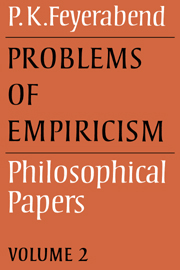Book contents
- Frontmatter
- Contents
- Introduction to volumes 1 and 2
- 1 Historical background
- 2 Classical empiricism
- 3 The structure of science
- 4 Two models of epistemic change
- 5 Philosophy of science versus scientific practice
- 6 Mach, Einstein and the Popperians
- 7 Wittgenstein's Philosophical Investigations
- 8 Consolations for the specialist
- 9 Popper's Objective Knowledge
- 10 The methodology of scientific research programmes
- 11 More clothes from the emperor's bargain basement
- Sources
- Name Index
- Subject Index
4 - Two models of epistemic change
Mill and Hegel
Published online by Cambridge University Press: 05 June 2012
- Frontmatter
- Contents
- Introduction to volumes 1 and 2
- 1 Historical background
- 2 Classical empiricism
- 3 The structure of science
- 4 Two models of epistemic change
- 5 Philosophy of science versus scientific practice
- 6 Mach, Einstein and the Popperians
- 7 Wittgenstein's Philosophical Investigations
- 8 Consolations for the specialist
- 9 Popper's Objective Knowledge
- 10 The methodology of scientific research programmes
- 11 More clothes from the emperor's bargain basement
- Sources
- Name Index
- Subject Index
Summary
The idea that a pluralistic methodology is necessary both for the advancement of knowledge and for the development of our individuality has been discussed by J. S. Mill in his admirable essay On Liberty (quoted from M. Cohen (ed.), The philosophy of John Stuart Mill (New York, 1961)). This essay, according to Mill, is ‘a kind of philosophical text book of a single truth, which the changes progressively taking place in modern society tend to bring out into ever stronger relief: the importance, to man and society, of a large variety in types of character, and of giving full freedom to human nature to expand itself in innumerable and conflicting directions.’ Such variety is necessary both for the production of ‘well-developed human beings’ (Cohen, Philosophy of J. S. Mill, 258) and for the improvement of civilization. ‘What has made the European family of nations an improving, instead of a stationary, portion of mankind? Not any superior excellence in them, which, when it exists, exists as the effect, not as the cause, but their remarkable diversity of character and culture. Individuals, classes, nations have been extremely unlike one another: they have struck out a great variety of paths, each leading to something valuable; and although at every period those who traveled in different paths have been intolerant of one another, and each would have thought it an excellent thing if all the rest would have been compelled to travel his road, their attempts to thwart each other's development have rarely had any permanent success, and each has in time endured to receive the good which the others have offered.
- Type
- Chapter
- Information
- Problems of EmpiricismPhilosophical Papers, pp. 65 - 79Publisher: Cambridge University PressPrint publication year: 1981
- 6
- Cited by

